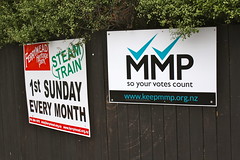 |
| A new version of the image http://en.wikipedia.org/wiki/File:NZParliamentbuildings.JPG to be used on portuguese wikipedia. (Photo credit: Wikipedia) |
 |
| IMG_2526 (Photo credit: laderafrutal) |
The value of being a list member in Parliament has been questioned during the second day of hearings into the review of the Mixed Member Proportional (MMP) voting system.
The Electoral Commission is hearing submissions in Wellington, following a referendum vote at the general election in November last year to retain MMP.
On Tuesday, several submitters told the commission the role of list MP is often viewed as second-class to an electorate MP.
There are 50 list MPs in Parliament. They are elected by the nationwide party vote, rather than by a geographical constituency.
Wellington resident Su-Wuen Ong told the commission the public unfairly downplays the entry of list MPs to Parliament and they should being given higher duties because they do not have to deal with electorate matters.
A former Parliamentary librarian, Antony Reed, told the commission the profile of list MPs needs to be lifted to reflect their equal footing with electorate MPs.
The Green Party says downplaying list MPs is just a hangover effect from the previous voting system First Past the Post.
The Greens told the commission on Tuesday the rule that allows an MP who wins an electorate seat to bring other party members into Parliament should be removed from MMP.
At present, a party can gain entry into Parliament by either getting 5% of the party vote or by having an MP win an electorate seat.
Greens' national co-convener Roland Sapsford says the one-seat electorate threshold is unfair and all political parties should be on a level playing field.
"Our view was at the outset, it actually provided a bit of a safety valve while people learned about MMP. But what we're seeing at the moment has been, as we noted, some iniquity between for example, parties with very similar party vote."
However, Mr Sapsford says the Green Party acknowledges this may create a higher barrier of entry into Parliament for small parties and the 5% party vote threshold may need to be lowered.
CTU calls for 4% party vote threshold
The Council of Trade Unions says political parties should have to receive 4% of the party vote to get into Parliament, and the one seat threshold should be removed.In his submission on Tuesday, CTU secretary Peter Conway said allowing political parties into Parliament by winning one electorate seat, is unfair, distorts election outcomes and encourages parties to abuse the MMP system.
Mr Conway says this was evident in 2008 when the ACT Party took five seats in Parliament by winning one seat in the Epsom electorate - even though it received fewer votes than New Zealand First, which ended up with no seats.
He says the one-seat electorate threshold should be removed and replaced with a party vote threshold of 4%.
Mr Conway told the hearing that if the party vote threshold goes too low, there is nothing to stop wealthy individuals from creating and bankrolling political parties and influencing the make-up of Parliament.
The Electoral Commission is to submit its final report to the Minister of Justice on 31 October.
I would favour the electorate threshold being removed and replaced with a party threshold of 4%. This would improve the MMP system. I woud also support the waka-jumping legislation that prevents list MP's leaving their parties.
Acknowledgements: © 2012, Radio New Zealand

Some Members of Parliament in my country forget about their duty to represent the people.
ReplyDeleteA lot genuinely enter parliament with great intentions, then get corrupted by the system and forget why they went there. They forget their duty to the people.
ReplyDelete